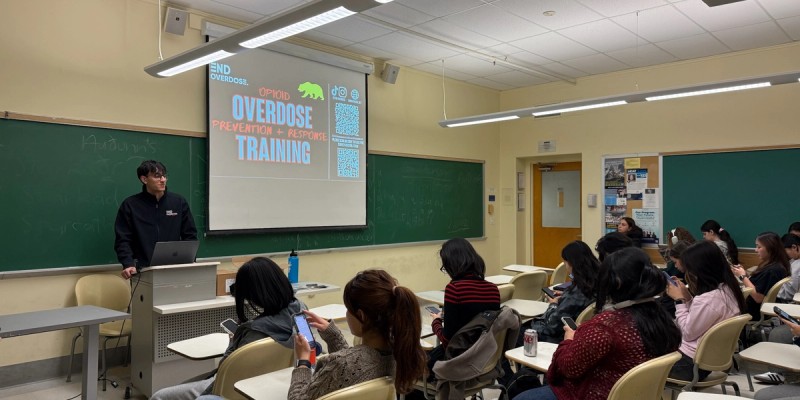End Overdose's chapter program is vital to our success in equipping young people with lifesaving education and resources. Rather than proselytizing from a soapbox to Gen-Z and Millennials, we trust young people in cities and on college campuses to spread the word through a true peer-to-peer model. Our members and volunteers are committing endless hours to End Overdose's cause, so we want to highlight a chapter every week.
Today, we're proud to highlight our UC Berkeley chapter! We spoke with co-president Shaan Gogna about his background in the Bay Area, his chapter's work on campus, and much more.
What sparked your interest in overdose prevention/response and End Overdose in particular?
Growing up in the Bay Area, the fentanyl crisis was never a distant issue, it was part of our reality. My interest in addressing this crisis began during my time at UC Riverside, where I volunteered for two years on the events team of the End Overdose chapter. After transferring to UC Berkeley and witnessing the strong foundation laid by the chapter’s previous leaders, I felt inspired to continue advancing our mission. End Overdose is an organization I’m deeply proud to be part of because it confronts stigmatized topics; such as drug use, overdose, and addiction; with empathy, education, and action. By transforming these difficult conversations into accessible, preventative, and hands-on training, we empower individuals to be prepared for real-world situations that could save lives. Can you describe your experience as chapter president of UC Berkeley?
Although my time as Chapter President of End Overdose at UC Berkeley is still in its early stages, I’m incredibly excited about the direction we’re headed and the impact we can make over the next two semesters. I’m stepping into this role following the outstanding leadership of Shannon and Tyler, who built a strong foundation rooted in compassion, education, and community engagement. It’s an honor to follow in their footsteps, and I’m committed to continuing their legacy while also introducing new initiatives that broaden our reach and deepen our impact. From expanding campus partnerships to increasing naloxone accessibility and hosting more frequent trainings, I see tremendous potential for growth, and I’m eager to lead a team that’s as passionate as I am about making overdose prevention the standard, not the exception. How have you developed authentic connections within the community?
I’ve developed authentic connections within the community by meeting people where they are, both literally and figuratively. Through my work with End Overdose, I’ve engaged directly with students, faculty, and local organizations by hosting training sessions for organizations, tabling events, and collaborative workshops that emphasize empathy and overdose prevention. I don’t see this work as just distributing naloxone or spreading awareness, I see it as building trust around difficult conversations. Whether it's helping a student feel more confident administering naloxone or talking to someone who’s lost a loved one to overdose, I approach each interaction with respect, openness, and a willingness to listen. These relationships are built not through formality, but through shared experiences and genuine care for one another’s well-being. What’re the major highlights from your chapter’s work to date?
A major highlight from our chapter’s recent work was hosting Casino Night in collaboration with the ATO Fraternity. It served as a fun and approachable way to engage students who might not otherwise attend a traditional overdose prevention event. By creating a relaxed environment centered around games like poker and blackjack, we were able to start meaningful conversations about overdose awareness and reach new members of the community, all while fostering connection and having a great time. What do you envision for the future of your chapter?
I envision our chapter growing into one of the most accessible and visible overdose prevention organizations on campus. My goal is to expand our reach by partnering with more student groups, Greek organizations, and campus health services to normalize conversations around overdose prevention. I also hope to increase the number of students trained in naloxone administration by hosting more frequent and diverse training events, training pop-ups in high-traffic areas and collaborations with cultural and professional clubs. Beyond campus, I’d love for our chapter to build stronger ties with the broader Bay Area community, including local nonprofits, clinics, and schools, and a lot more festivals to make a wider impact. Ultimately, I want End Overdose at UC Berkeley to be known not just for what we do, but for how we make people feel, empowered, informed, and supported!
